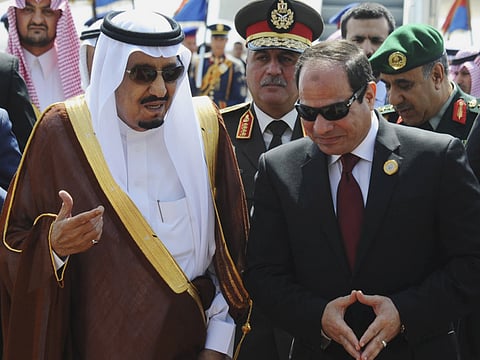A force for a strong Arab statement
Neither Saudi Arabia nor its GCC allies can tolerate subjugation of Arab masses

It did not take long for Arabs to measure the long-term repercussions of Persian hegemony, and while the emerging deal between the P5+1 (US, Britain, France, Russia, China plus Germany) and Iran pretended to postpone the latter’s ability to produce enough nuclear fuel for a weapon, the League of Arab States finally agreed to create a substantial joint military force to meet existential threats to their respective sovereignties, ranging from predatory states to Daesh-like (the self-proclaimed Islamic State of Iraq and the Levant) extremists. To be sure, the principled announcement made by Egyptian President Abdul Fattah Al Sissi required years of cooperation and coordination, both of which were in short supply. Yet, and beyond its advocacy for military action, what was remarkable about the decision was the realisation that unprecedented challenges loomed over the horizon, some of which could no longer be resolved through well-established Arab preferences for compromise.
Sceptics will now devote the next few decades arguing over genuine realities that sensitive military coordination required. Most will conclude that little of it may be possible in a divided Arab World and that few should fall to short-term gains. Others will insist that things are changing a little and that a new Arab power is emerging. They will point to the Saudi-led Joint Arab Force against Al Houthis in Yemen, which was created in record time and that may still be enlarged to include non-Arab contributors, as a new paradigm. In all cases, what few could deny was the determination of men like Al Sissi and Saudi King Salman Bin Abdul Aziz, among others, not only to impose their will-to-power, but also to protect intrinsic national security interests.
This, above all else, is probably what came as a total surprise. How could polarised Arabs, many reasoned, manage their affairs and adopt unified positions? What motivated them to act in Yemen when few mustered the courage to use force in Iraq, Syria, Lebanon and, of course, in Palestine? What was so different about the Arabian Peninsula?
If compromise is part and parcel of the Arab DNA in the 20th century, most tolerated each other in troubled nation-states, whether in republics hijacked by dictators or monarchies mired in slow-changing traditions. A modus vivendi emerged over core concerns, headed by the ‘Question of Palestine’, though few mustered the wherewithal to confront a superior foe. Several wars were lost, but those were times when resources were scarce. Equally important, those were also times when Arab leaders, led by Egypt’s Jamal Abdul Nasser, perceived themselves as global actors — the non-aligned movement in his case — instead of focusing on core national security interests. Most were pigeon-holed in the East-West prism instead of investing in education and defence programmes. Most allowed themselves to be manipulated by foreign powers that, naturally, diminished their values and created internal opposition. Regrettably, most preferred to rule over masses of followers instead of empowering nationalist citizens who were taught to value their identities and who prepared to defend their respective nation.
Such policies produced currents of extremism that the Arab world confronts today and was likely to face for several more years, which the creation of the Joint Arab Force aims to defy. Naturally, Iran posed a threat too because it opted to use extremism as a vehicle to spread havoc, provoke sectarian differences and squeeze the conservative Arab Gulf monarchies in a classic pincher movement. Tehran worked towards a carefully calculated objective not only to emerge as a leading Muslim power, but also to subjugate Arab masses under its hegemony. Neither the Kingdom of Saudi Arabia nor any of its Gulf Cooperation Council allies could tolerate such an outcome, which is why they have opted to meet the Iran-sponsored Al Houthi takeover of Yemen.
In the words of Arab League Secretary-General Nabeel Al Arabi, the risk posed by Daesh, Al Houthis and similar outfits would likely spread beyond the areas in which they now hold sway — Eastern Syria, Western Iraq, parts of Libya, and a solid chunk of Yemen — if it were not robustly taken on. King Salman answered the call as Riyadh understood that his very society was in danger. His desire to act in Yemen broke that mould and chances were good that similar initiatives may be adopted elsewhere — from Iraq to Syria and from Lebanon to Libya — although future steps may require time as Arab League members acquire the necessary tools.
At the last summit in Sharm Al Shaikh, Al Sissi announced that a letter from Russian President Vladimir Putin would be read out to the gathering, in which Putin declared that Moscow supported Arab “aspirations for a prosperous future and for the resolution of all the problems the Arab world faces through peaceful means, without any external interference”. His comments triggered a sharp rebuttal from Prince Saud Al Faisal, who reflected Riyadh’s frustration when the Saudi Foreign Minister stated: “He speaks about the problems in the Middle East as though Russia is not influencing these problems.” The refutation is yet another solid illustration that Riyadh means business.
Dr Joseph A. Kechichian is the author of the recently published ‘Iffat Al Thunayan: An Arabian Queen, London: Sussex Academic Press, 2015.



